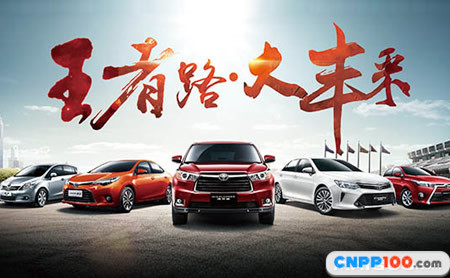
Founded in 1937 in Japan, the world's top 500, the world's famous car manufacturer, best-selling car brand, its own FJ Cruiser/RAV4/Corolla/Crown/Ruizhi/Prius/Corolla/Vios/Camry and other models
Toyota is one of the world's top ten automobile industry companies, the world's largest automobile company, Toyota Kiichiro in 1933 in the Toyota Industries Loom Manufacture established the Automobile Department, in 1937 the Automobile Department was officially independent from the Toyota Industries Factory, the establishment of Toyota Motor Industries. In the early days, Toyota, Crown, Guangguan and Corolla cars were famous, and recently Cressida and Lexus luxury cars are also very prestigious. Toyota is one of the world's top three companies in terms of car sales, sales, and popularity. Toyota manufactures a wide range of automobiles, including general mass cars, premium cars, vans, sports cars, four-wheel drive vehicles, and commercial vehicles.
Toyota logo
Meaning of the TOYOTA Logo (October 1989 set)
Published in October 1989 on the occasion of TOYOTA's 50th anniversary, the design focuses on the symmetrical composition of the oval shape. An ellipse is a curve with two centers, indicating that the car manufacturer is in touch with the customer. In addition, the horizontal and vertical ellipses are combined to represent the first letter T of Toyota. The space behind it means that TOYOTA's advanced technology is expanding and extending around the world, facing the future and the universe.
Toyota founded
The founder of Toyota is Kiichiro Toyoda. Kiichiro Toyoda was born in Japan in 1895 and graduated from the Faculty of Engineering of Tokyo Imperial High School majoring in mechanical engineering. At the end of 1929, Kiichiro Toyoda personally inspected the automobile industry in Europe and the United States. In 1933, the Automobile Division was established at the Toyota Industries Loom Works. Kazuo Kumabe, a classmate of Kiichiro Toyoda, bought him a German DKW front-wheel drive car from Germany, and after two years of disassembly and research, he finally built a GI car in August 1935. The car is a two-stroke twin-cylinder with a wooden body and a roof sewn into leather.
In 1934, Kiichiro Toyoda decided to establish a car production plant. In 1937, Toyota Motor Industry Co., Ltd. was established in Juda, Aichi Prefecture, with an initial capital of 12 million yen and more than 300 employees.
From the end of 1936 to the beginning of 1937, sales of Toyota-made trucks were sluggish due to poor quality. After Japan launched the war of aggression against China, the army purchased a large number of trucks, and all of Toyota's inventory cars were sold out, and Toyota made a lot of money.
In April 1950, Toyota Motor Leo Company was established, and in June 1950, the Korean War broke out, and the U.S. military placed a huge order of 4.6 billion US dollars, and Toyota developed rapidly. On March 27, 1952, Kiichiro Toyoda died of a cerebral hemorrhage due to agitation. In 1974, Toyota formed the Toyota Group with 16 companies, including Hino and Daihatsu, and formed a network of more than 280 small and medium-sized enterprises. In July 1982, Toyota Motor Industry Corporation and Toyota Motor Sales Corporation were reunited and officially renamed Toyota Motor Corporation.
Toyota's product range includes automobiles, iron and steel, machine tools, electronics, textile machinery, textiles, household products, chemicals, construction machinery and construction industries. In 1993, the total sales were 85.283 billion US dollars, ranking fifth among the world's industrial companies. It produced 4.45 million vehicles in the year, accounting for 9.4% of the world automobile market. In 2006, Toyota's global car sales were 8.808 million units.
Toyota in China
In China, Toyota is also striving to contribute to the development of Chinese society by providing customers with high-quality automotive products and services based on its corporate philosophy of "creating a prosperous society through automobiles."
In terms of business development, Toyota is actively involved in the business of vehicles, engines, and automotive facilities in China. With the support of national policies, Toyota has cooperated with FAW Group and Guangzhou Automobile Group respectively, and so far, it has established 6 joint venture vehicle plants and 4 engine plants in Tianjin, Guangzhou, Chengdu and Changchun, and launched 15 models that are popular among Chinese users, including the hybrid car PRIUS and the Camry HEV. As of October 2013, Toyota has imported seven Toyota brand models and 17 Lexus brand models, including five hybrid models.
So far, Toyota has set up 9 wholly-owned companies, 12 joint ventures and 4 representative offices in 8 provinces and municipalities in China, and has more than 35,000 Chinese employees actively contributing to the development of China's automobile industry and automobile market in various related fields such as production, sales and after-sales service. At the same time, Toyota strives to integrate into Chinese society and contribute to the harmonious development of China's economy and society, focusing on "environmental protection", "traffic safety", and "human resource development", and strives to become an excellent corporate citizen recognized and trusted by Chinese society.













